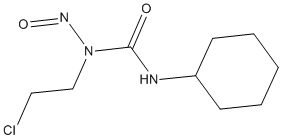
Lomustine (CeeNU) is an alkylating agent of value against both hematologic malignancies and solid tumors. Lomustine is a highly lipophilic nitrosourea compound which undergoes hydrolysis in vivo to form reactive metabolites. These metabolites cause alkylation and cross-linking of DNA. Other biologic effects include inhibition of DNA synthesis and some cell cycle phase specificity. Nitrosureas generally lack cross-resistance with other alkylating agents.
| Cell Experiment | |
|---|---|
| Cell lines | XP cells |
| Preparation method | Growing cell lines routinely as monolayers in DMEM supplemented with 10% foetal calf serum, 25 mm HEPES, glutamine and penicillin/streptomycin. Carrying cytotoxicity studies out in HEPES-free medium in a 5% CO2 atmosphere. Plating 750-1000 cells/well in 96 well plates and after overnight incubation,treating them for 2 hours with or without 33 μM BG. Then adding temozolomide or CCNU for 1 hour in the same medium, the final DMSO concentration not exceeding 1%. Growing the cells for a further 7 days in fresh medium and assaying for protein content by the NCI sulphorhodamine assay; growth studies show that during the assay period cells are in log phase growth . For the repeat temozolomide dosing schedule, cells are given consecutive 24 hours treatments, with fresh medium each day. Carrying assays out at least in duplicate. |
| Concentrations | 133 μM |
| Incubation time | 1 hour |
| Animal Experiment | |
|---|---|
| Animal models | Dogs |
| Formulation | Saline |
| Dosages | 90 mg/m2 |
| Administration | Orally |
| Molecular Weight | 233.7 |
| Formula | C9H16ClN3O2 |
| CAS Number | 13010-47-4 |
| Form | Solid |
| Solubility (25°C) | DMSO 40 mg/mL |
| Storage |
Powder -20°C 3 years ; 4°C 2 years In solvent -80°C 6 months ; -20°C 1 month |
| Species | Mouse | Rat | Rabbit | Guinea pig | Hamster | Dog |
| Weight (kg) | 0.02 | 0.15 | 1.8 | 0.4 | 0.08 | 10 |
| Body Surface Area (m2) | 0.007 | 0.025 | 0.15 | 0.05 | 0.02 | 0.5 |
| Km factor | 3 | 6 | 12 | 8 | 5 | 20 |
| Animal A (mg/kg) = Animal B (mg/kg) multiplied by | Animal B Km |
| Animal A Km |
For example, to modify the dose of Compound A used for a mouse (20 mg/kg) to a dose based on the BSA for a rat, multiply 20 mg/kg by the Km factor for a mouse and then divide by the Km factor for a rat. This calculation results in a rat equivalent dose for Compound A of 10 mg/kg.
[2] Alaaeddin Alrohaibani, et al. Microangiopathy, lomustine, and karyomegalic mesangial cells
[3] Michael Weller, et al. How did lomustine become standard of care in recurrent glioblastoma?
| Related DNA Alkylator/Crosslinker Products |
|---|
| LP-284
LP-284 is a potent DNA alkylating agent that kills solid tumours. LP-284 can be used in the studies of hematologic cancers with compromised DNA repair, such as mantle cell lymphoma (MCL). |
| 4-Hydroperoxy cyclophosphamide
4-Hydroperoxy cyclophosphamide, the active metabolite form of the precursor Cyclophosphamide, cross-links DNA and induces T-cell apoptosis independent of caspase receptor activation, as well as activating the mitochondrial death pathway through the generation of reactive oxygen species (ROS). It can be used in studies related to rheumatoid arthritis and autoimmune diseases. |
| Diaziquone
Diaziquone is a water-soluble synthetic aziridinyl benzoquinone that selectively alkylates and cross-links DNA, inhibits DNA replication, induces apoptosis, and inhibits the proliferation of tumor cells, with potential antitumor activity. |
| Semustine
Semustine is a methylated derivative of Carmustine and also a DNA alkylating agent, which can form covalent bonds with nucleophilic centers in DNA, causing depurination, base pair miscoding, strand breaks, and DNA-DNA cross-linking, and has antitumor activity. |
| Methyl methanesulfonate
Methyl methanesulfonate is a SN2-type alkylating agent that primarily methylates the nitrogen atom in purines and has apoptosis-inducing effects. |


Products are for research use only. Not for human use. We do not sell to patients.
© Copyright 2010-2023 AbMole BioScience. All Rights Reserved.
